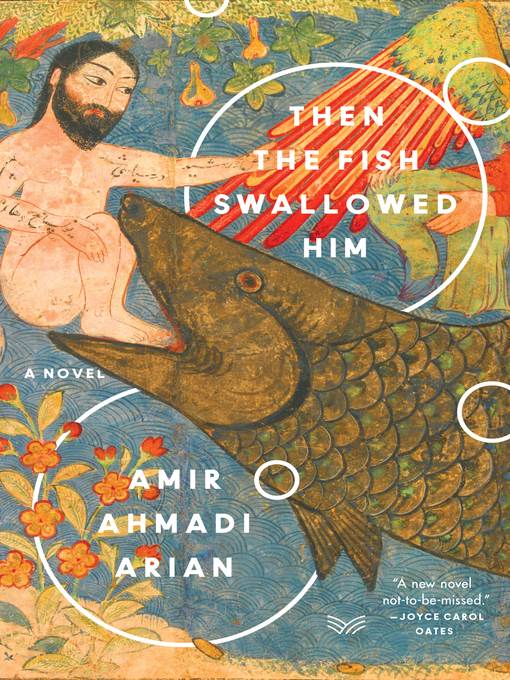
Then the Fish Swallowed Him
A Novel
کتاب های مرتبط
- اطلاعات
- نقد و بررسی
- دیدگاه کاربران
نقد و بررسی

January 15, 2020
A Tehran bus driver is arrested during a strike, making him a pawn of Iranian politics and a victim of cruel imprisonment. Yunus, the narrator of this brisk and piercing protest novel, is a demure middle-aged man who's striven to keep the turmoil of Iranian politics at arm's length: The 1979 revolution was overshadowed by his father's death and his mother's ensuing depression and maybe suicide. So he's blithely confident his participation in a 2005 drivers' strike can only be perceived as a reasonable plea for better treatment, not part of a global insurrection against the Ahmadinejad regime. What's the harm of reading Foucault and Marx with fellow union members? Plenty, the regime believes, and after Yunus beats a young counterprotester in a fit of anger, he's arrested, sent to Tehran's fearsome Evin prison, and told his victim was the son of the transportation minister. Whether the allegation is true or not, Yunus' prison stint becomes an unjust torment of beatings, forced confessions, and the slow-creeping madness of solitary confinement. (In one well-turned, poignant scene, he pleads with a fly not to abandon him.) This novel, the first in English by the Iranian-born Arian, is scaffolded with familiar tropes of kangaroo courts, false statements, and good-cop, bad-cop routines. But the author writes about Yunus' plight with a plainspoken, lacerating intensity. Moreover, Yunus is a richly imagined character who reckons with the consequences of his political ignorance and an ill-advised affair that's used as further ammunition against him. A few books and some bad judgment do not an enemy of the state make, but Arian expertly tracks Yunus' gears' turning from anger to depression to self-judging. Yunus' mental disorientation is as punishing as his beatings and, as the closing pages show, leaves lasting harm. A distressing, smartly interior tale of the horrors sown by oppressive politics.
COPYRIGHT(2020) Kirkus Reviews, ALL RIGHTS RESERVED.

Starred review from March 1, 2020
Reminiscent of Camus' The Stranger, Iranian writer Arian's first novel published in the U.S. excels in its own right for its sheer literary and moral brilliance. Yunus Turabi, a nondescript bus driver in Tehran, ambivalently participates in a strike only to be reminded that, oftentimes, civil disobedience yields little and circumstances remain the same. When mild-mannered Yunus is provoked and entangled in an altercation, his fit of rage lands him in prison. Handcuffed and blindfolded, Yunus is condemned to solitary confinement where he is tortured. Yunus' physical and emotional journey is brought to life through the riveting and extraordinary details in Arian's intense portrayal. Despite his detention and psychological fragility, Yunus is able to find beauty and peace in the mundane. However, when his will to withstand mental and corporeal battering wavers, Yunus is forced to choose between succumbing to the interrogator's commands or maintaining his innocence. As Yunus confronts his past as a son, human being, and Iranian citizen, he must also come to terms with his uncertain future. In this stunning work, Arian accomplishes a rare feat by telling a captivating story of an unforgettable character and by bearing witness to the hard truths endured by political prisoners everywhere.(Reprinted with permission of Booklist, copyright 2020, American Library Association.)

Starred review from May 4, 2020
Arian’s hard-hitting English-language debut follows bus driver Yunus Turabi and his breakdown subsequent to a union strike—resulting in a devastating stint in prison. Yunus, 44, lives alone in Tehran. When he bumps into coworker Behrouz at a grocery store, Behrouz invites him to his house for dinner—and to join the union. Yunus then participates in a strike that turns violent, with the police and protestors clashing. The next day, in a state of despair over the fighting and a longing for human connection, he decides to drive his route anyway. When the passengers crowd and harass each other and a boy calls Yunus and the other bus drivers “sleazy assholes” who refuse to do their jobs, Yunus beats him nearly to death. The boy turns out to be the son of a minister, and Yunus is sentenced to four years in prison. During this time, he recalls his affair with Behrouz’s wife, who cut things off abruptly. When he’s finally released, he’s broken and adrift, having falsely confessed to masterminding the protest. Arian blends sharp, journalistic observations of Tehran’s politics and street scenes with a deeply empathetic portrait of Yunus’s troubled interior life. This is an essential work of contemporary Iran.

























دیدگاه کاربران